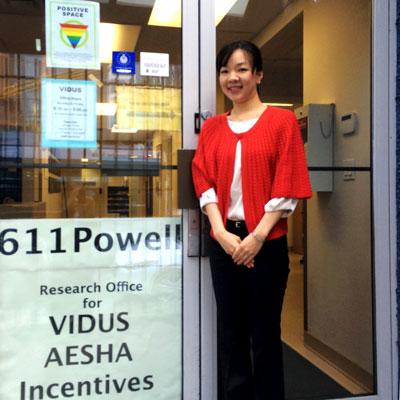This April Dr. Hayashi became one of two of UBC’s many outstanding postdoctoral research fellows to be awarded a UBC Killam Postdoctoral Research Prize in recognition of her research achievements while at UBC.

Research topic
Research Description
Illicit drug use is associated with an array of health and social harms for individuals and communities, including high rates of overdoses and epidemics of infectious diseases such as HIV and hepatitis C virus infection. In Canada, cost of substance abuse has been estimated to approach $40 billion annually. My UBC postdoctoral research focuses on illicit drug use and related harms and aims to help inform the policy and programming to reduce drug-related harms. While my research aims to address various drug-related harms, currently, I particularly seek to investigate and address the impacts of crack cocaine/cocaine use and treatments for crack cocaine/cocaine addiction on the health and healthcare access among polysubstance users (e.g., users of opiates and crack cocaine/cocaine) in Vancouver.
Why did you decide to pursue a postdoctoral fellowship at UBC? Did you consider other opportunities?
Vancouver/UBC offers an ideal and vibrant research environment that is the home of many of the leading figures in my field, including Dr. Evan Wood (Professor of Medicine at UBC; my supervisor) who is spearheading the modernization of addiction medicine in Canada, Dr. Thomas Kerr (Associate Professor at the Division of AIDS, Department of Medicine at UBC) who is an internationally renowned health scientist in the field of drug addiction, and Dr. Julio Montaner (Head of the Division of AIDS at UBC, and Director of the BC Centre for Excellence in HIV/AIDS) who has revolutionalized the HIV/AIDS response globally and locally. Also, my host institution (the BC Centre for Excellence in HIV/AIDS) has excellent research infrastructure, which uniquely allows me to conduct my research and develop a new program of research.
What advice do you have for new postdoctoral fellows?
While UBC offers endless opportunities, you may sometimes find it difficult to navigate yourself through this huge institution. I would advise new postdocs to proactively reach out to senior postdocs whenever they can. Also, be prepared for the rain in the fall and winter!
What does receiving this award mean for your career?
This award is a huge honor for me. I couldn’t have received this award without support from my fabulous mentors and colleagues. I would like to take this opportunity to express my sincere gratitude to them. At the same time, I also think this is the beginning of more exciting and meaningful research career for me.
What do you hope to accomplish with your current work?
I have recently developed a grant that proposes a clinical trial to investigate the efficacy of a novel pharmacotherapy to treat crack cocaine/cocaine addiction among crack cocaine/cocaine-using patients who are enrolled in methadone maintenance therapy (i.e., people who have dual addiction to opiates and crack cocaine/cocaine). As there are currently no approved medications to treat crack cocaine/cocaine addiction, I hope this clinical trial will address the gap and potentially lead to the identification of an effective pharmacotherapy to address the harms of ongoing crack cocaine/cocaine use among methadone-treated polysubstance addicted patients.
What happens in a great day at the office?
A great day is when I am inspired by some of my many colleagues from multidisciplinary backgrounds and get novel research ideas. This happens via emails, in meetings, or while having a chat in a hallway, and actually happens almost on a daily basis.
What research related or academic event coming up in the near future are you most excited about?
There are three international conferences that I plan to attend this year, and I am very excited about each of them. In May, I will attend the 9th Annual Conference of the International Society for the Study of Drug Policy in Belgium, for which I was awarded the Scholarship for Asian Scholars. As the Special Session of the United Nations General Assembly on the World Drug Program will be held in New York in 2016, the conference offers a great opportunity to engage in cutting-edge discussions about international drug policy research. In July the 8th International AIDS Society Conference will be held here in Vancouver, where I will present my most recent research on the impact of addiction treatment on HIV treatment outcomes among HIV-positive crack cocaine users. In October, the 24th International Harm Reduction Conference will be held in Malaysia, which is a major international event for the movement towards reducing drug-related harms.
For you, what was the best surprise about UBC or life in Vancouver?
I am constantly surprised at the friendliness of people and the proximity to wild nature in Vancouver.